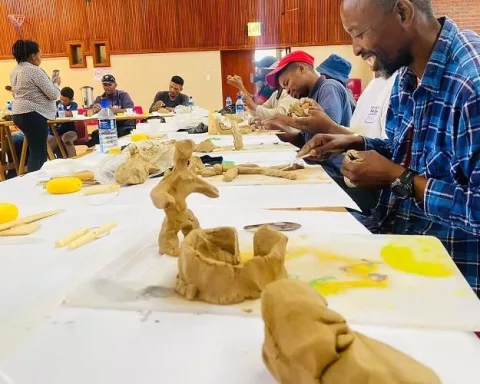Mpharu Hloyi, Cape Town’s first black female scientific officer and advocate against gender-based violence, was tragically shot and killed by Ivan Magokane, a man she had tried to help. Magokane was sentenced to life in prison for Hloyi’s murder and other charges. Hloyi’s passing left an immeasurable void in the city she had served with unwavering devotion. This heartrending tale underscores the bravery of women like Hloyi and Malema, who persist in their fight against gender-based violence, inspiring hope for a future devoid of oppression and fear.
Who was Mpharu Hloyi and what happened to her?
Mpharu Hloyi was Cape Town’s first black female scientific officer and an advocate against gender-based violence. She was tragically shot and killed by Ivan Magokane, a man she had tried to help, at the Athlone Wastewater Treatment Plant in March 2022. Magokane was sentenced to life in prison for Hloyi’s murder and other charges. Hloyi’s passing left an immeasurable void in the city she had served with unwavering devotion.
A Frosty Dawn in Cape Town
March 28, 2022, began like any other day in Cape Town until the tranquillity of the city was shattered by a gunshot’s chilling reverberation. Mpharu Hloyi, the city’s first black female scientific officer and a torchbearer in the campaign against gender-based violence, was the unfortunate victim. The perpetrator of this malevolent act was none other than Ivan Magokane, a man Hloyi had endeavoured to assist. The atrocious crime took place at the seemingly tranquil Athlone Wastewater Treatment Plant.
Hloyi was not just an ordinary civil servant; she was a passionate devotee of science, a spirited activist, and a cornerstone of her community. Her premature demise sent shockwaves across the city as it mourned the loss of a dedicated and committed public servant. Her passing was felt personally by her family and left an immeasurable void in the city she had served with unwavering devotion.
A Twisted Love Story and an Ominous Threat
The intricate relationship between Magokane and Dr. Shirley Malema, Hloyi’s associate, unfolded like a love story gone awry. Malema, once betrothed to Magokane, depicted him as an abusive partner, an agonizing revelation that precipitated the end of their union. However, this didn’t deter Magokane from continuing to torment her, showing up unexpectedly and escalating the situation to alarming heights.
One particular incident served as a grim harbinger of Magokane’s potential for violence. He presented Malema with two bullets, a stark emblem of his dangerous intentions that instilled in her a deep-seated fear of his capability to commit a heinous crime.
On the tragic day of Hloyi’s assassination, Magokane made an appearance at the treatment plant to see her. After informing Malema, who subsequently notified the police, Hloyi mustered one last valiant effort to offer Magokane counselling. Tragically, during a supposed altercation as he feigned leaving, Hloyi was shot, succumbing to a mortal gunshot wound to the head. Her life, filled with service and activism, met a tragic end.
A Reign of Terror and Swift Justice
Magokane’s reign of terror didn’t stop with Hloyi’s murder. According to IOL, he fired a barrage of bullets at Malema and two other employees of the treatment plant. The court responded swiftly, with Acting Deputy Judge President Andre le Grange convicting him of one count of murder, two counts of attempted murder, and one count of assault against Malema.
In his verdict, le Grange described Hloyi as the ‘lifeblood of her family,’ recognizing the deep wounds her family bore as a result of her absence. He rebuked Magokane’s lack of repentance and his brazen attack on Malema. His violent actions were a ruthless display of power against an unarmed woman who was merely trying to diffuse a tense situation.
Magokane was handed a life sentence for Hloyi’s murder and an additional ten years for each attempted murder charge, along with a six-month sentence for assault. These sentences will run concurrently, equating to a total of 25 years behind bars.
The Wounds that Never Heal
Despite the stringent punishment, the anguish of Hloyi’s passing remains. Her sister, Motlatsi Mpete, acknowledged the court’s decision with a heavy heart, expressing that no punishment can ever bring back a lost one. Remembered by her family as a spiritual woman, a relentless activist against gender-based violence, and a community leader, Hloyi’s absence continues to resonate within her family and community.
This heartrending tale is a sobering reminder of the perils of gender-based violence and the critical need for societal reform. It underscores the bravery of women like Hloyi and Malema, who, in the face of adversity, persist in their fight against such violence. Their resilience and tenacity, encapsulated in Hloyi’s legacy, inspire hope for a future devoid of oppression and fear.
-
Who was Mpharu Hloyi and what was her role in Cape Town?
Mpharu Hloyi was Cape Town’s first black female scientific officer and an advocate against gender-based violence. She was a passionate devotee of science, a spirited activist, and a cornerstone of her community. -
How did Hloyi die?
Hloyi was tragically shot and killed by Ivan Magokane, a man she had tried to help, at the Athlone Wastewater Treatment Plant in March 2022. -
Who was Ivan Magokane and what was his relationship with Dr. Shirley Malema?
Ivan Magokane was the man who shot and killed Mpharu Hloyi. He had a relationship with Dr. Shirley Malema, who he had previously been engaged to. Malema had described him as an abusive partner, and he had continued to torment her after their relationship ended. -
What happened on the day of Hloyi’s assassination?
Magokane made an appearance at the treatment plant to see Hloyi and she attempted to counsel him. During a supposed altercation as he feigned leaving, Hloyi was shot and she died as a result of a mortal gunshot wound to the head. -
What was the court’s response to Magokane’s actions?
Magokane was convicted of one count of murder, two counts of attempted murder, and one count of assault against Dr. Shirley Malema. He was sentenced to life in prison for Hloyi’s murder and an additional ten years for each attempted murder charge, along with a six-month sentence for assault. -
What is the message of this heartrending tale?
This heartrending tale is a sobering reminder of the perils of gender-based violence and the critical need for societal reform. It underscores the bravery of women like Hloyi and Malema, who persist in their fight against such violence, inspiring hope for a future devoid of oppression and fear.












